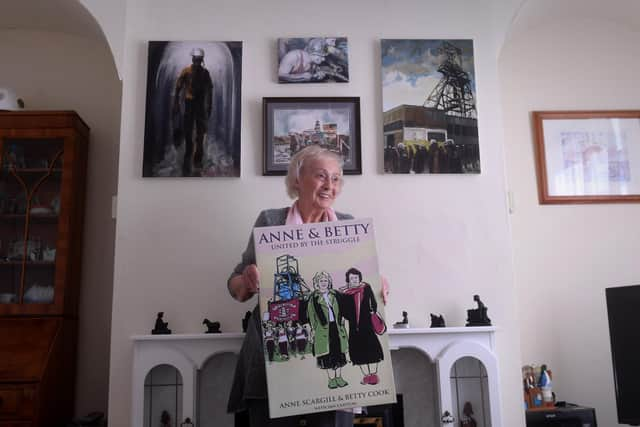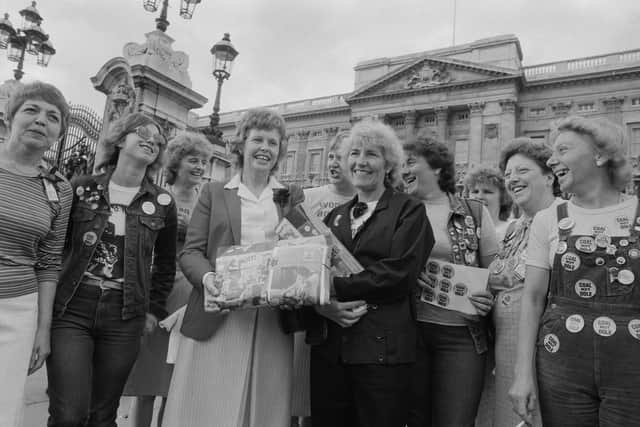Miners' strike at 40: How Yorkshire's women stepped up to support their families and communities
The old norm of putting food on the table and staying home to bring up the kids began to dissolve as women took up picketing, fundraising, organising protests, public speaking and, after the strike, university education.
“I used to come home from work about 9pm, have something to eat and by 12 o’clock I was back out to get on the picket lines,” recalled Betty Cook, who was working part-time in the evenings when her then husband was on strike at Woolley colliery. “I’d come home in the morning, have a couple of hours sleep and then go back to work again.
Advertisement
Hide AdAdvertisement
Hide Ad“At one stage, my mum, who was a conventional wife, told me because of everything I was doing I wasn’t fit to be a mother or a wife.”


A miner’s daughter as well as a miner’s wife, Betty took the criticism in her stride and won her mother over. “I just thought it was the way she was brought up. She’d never been liberated – in their days that was what happened. Later on she did admit she was really proud of me and what I’d been doing.”
Betty, now 85, had experienced both the previous miners’ strikes in 1972 and 1974 and been determined not to feel the same way in 1984.
She was working in mail order at the time of the strike after starting her working life as a nurse after leaving school. She gave up that job up when she married a miner and brought up her three sons in a pit house in Woolley.
Advertisement
Hide AdAdvertisement
Hide Ad“My ex-husband was a flying picket and he used to just come home for a change of clothes and I was left with the boys and we were cold and hungry and I cried most of the time.


“I knew in ‘84 it was going to be a long one so I changed from full-time to part-time working because this time I was going to be involved, I wasn’t going to sit and cry at home.”
Soon after the start of the strike, Betty and Anne Scargill, wife of NUM leader Arthur, met at a women’s support group in Barnsley. The two went on to become firm friends and leading lights in the Women Against Pit Closures (WAPC) movement.
As well as the traditional roles of organising soup kitchens and food parcels, women began campaigning in their own right.
Advertisement
Hide AdAdvertisement
Hide AdBy May 1984 the group was able to mobilise around 5,000 women from all over the country to a rally in Barnsley followed by a protest march in London in August which drew 20,000 women onto the streets.
Betty recalled being buoyed by the support that came from across the country and further afield including people’s generosity towards the Christmas appeal organised by WAPC.
“We went down to an address in London being used for the Christmas appeal and couldn’t believe the sacks of mail with donations.
“I remember a lone parent had sent money so people could have turkey on Christmas Day – the tears came with support like that.”
Advertisement
Hide AdAdvertisement
Hide AdInvolvement also meant increasing confidence and a determination to expand horizons. Attending a meeting organised by the then Greater London Council during the strike, Betty recalled receiving a particularly long and complicated question from the floor and responding by promising an answer once she’d got some education after the strike.
That may have been a slightly tongue-in-cheek response but Betty subsequently did an adult education course at Northern College in 1987 followed by a degree at Sheffield University in 1989.
Activism continued with campaigning against a new round of pit closures in 1993 and speaking engagements that took her far and wide including one at the World Social Forum in Mumbai with Anne Scargill.
Betty also continued working up to the age of 81 and still volunteers two days a week at the Salvation Army.
Advertisement
Hide AdAdvertisement
Hide AdHer life has been a sharp riposte to her former husband who had told her “it was no use explaining things to me because I wouldn’t understand.”
Betty said: “I began to grow in confidence because of the experience of the strike and beginning to realise I wasn’t thick and stupid.”
As she acknowledges 40 years on: “The strike completely changed my life.”